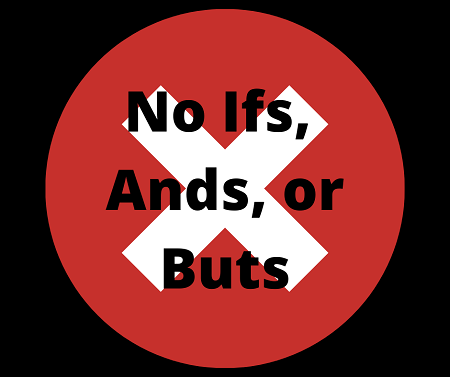No Ifs, Ands, or Buts
 “If you miss more than three classes, you fail. No ifs, ands, or buts about it.” Few students want to hear those words. Definitely not if they just missed a third class.
“If you miss more than three classes, you fail. No ifs, ands, or buts about it.” Few students want to hear those words. Definitely not if they just missed a third class.
“If you come home past curfew, you are grounded for a month. No ifs, ands, or buts.” Teenagers don’t like to hear that, especially if they just came home an hour past curfew.
No ifs, ands, or buts means no excuses.
People who say this want no:
- Arguments
- Compromises
- Explanations
- Protests
They expect others to do as instructed.
- Parents expect children to obey.
- Bosses expect workers to finish on time.
- Teachers expect students to complete assignments.
No ifs, ands, or buts also means certainty.
No doubt about it, the expected event will happen, rain or shine.
- Children promise parents they will obey.
- Workers assure bosses they will finish their work before the deadline.
- Students tell teachers they will complete their assignments before the next class.
Whether they finish early or work down to the wire, they will do it.
Everything works better when everyone meets their obligations.
A friend said she has often heard, “If ‘ifs’ and ‘buts’ were candy and nuts, we would all have a Merry Christmas.” She explained that people often say “if” or “but” instead of having faith all will work out exactly as it should.
- If anything needs to be done, do it.
- If anything needs to be said, say it.
No ifs, ands, or buts.
“Jesus replied, ‘Anyone who loves me will obey my teaching’” (John 14:23).
Do you have an expression you want explained? If so, please comment below.
Subscribe to receive my weekly posts by email and receive a free copy of “Words of Hope for Days that Hurt.”
If you enjoyed this post, please share it with your friends.
Thanks to Jeri Stone for the suggestion.